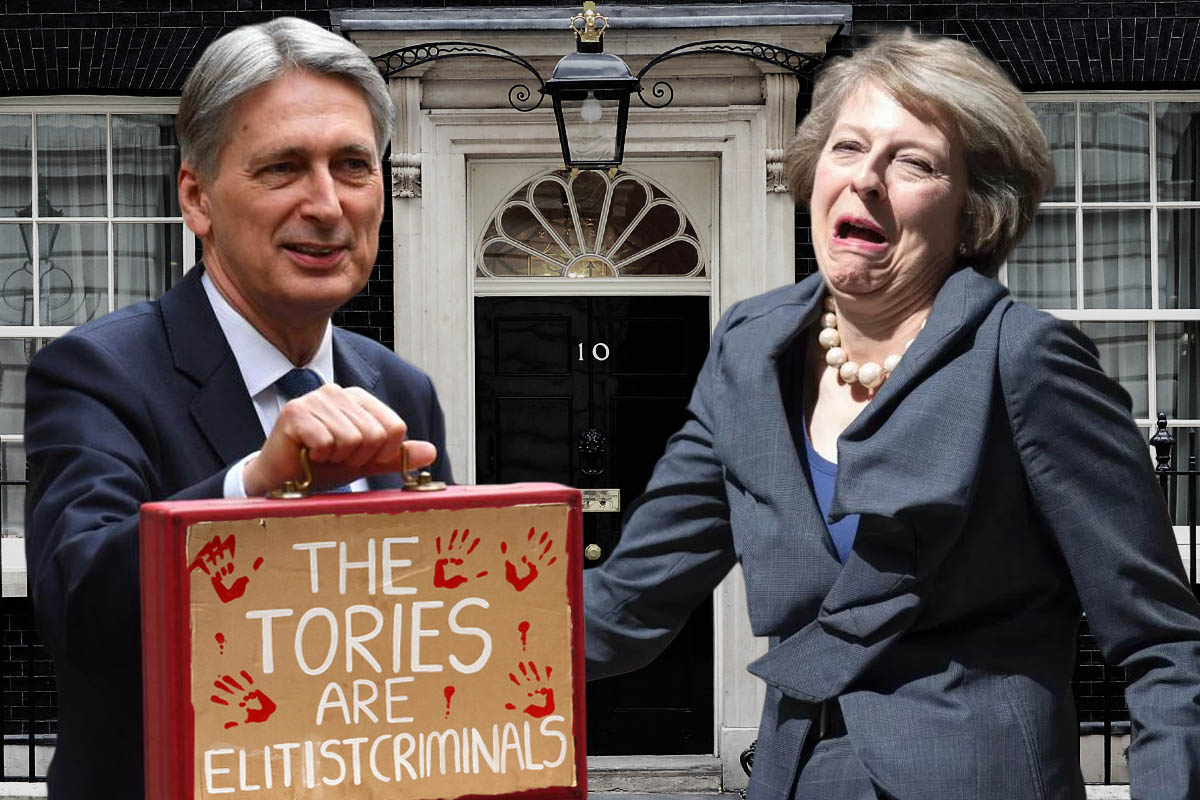The publication of the Conservative Party manifesto has made it clear that the choice facing Britain in the coming election is the starkest in recent memory. The depth of the crisis has forced the Tories to attack their most loyal support base, the elderly. Like Cameron before her, however, Theresa May’s hubris could prove to be her downfall.
The publication of the Conservative Party manifesto has made it clear that the choice facing Britain in the coming election is the starkest in recent memory.
In normal times, Tories standing for election are all smiles, waves and kissing babies, tripping over themselves to spout empty platitudes about all the great things they’ll do once elected. After the election all that evaporates as they proceed to implement their real programme: attacking the working class and governing in the interests of big business. And so it has always been.
Attacks on the young and old
In contrast, Theresa May, high on the hubris of a supposedly certain Tory landslide, has produced a manifesto that openly declares war on the British working class. Pensioners in particular have been singled out for a tsunami of austerity. The manifesto commits to a triple whammy of cuts by ditching the ‘triple-lock’ on pensions, meaning they are no longer guaranteed to increase by 2.5%; introducing a means test for the Winter Fuel Allowance, leaving more than 10 million pensioners to struggle with extortionate winter energy bills; and the so-called ‘death tax’ whereby pensioners will have to pay for the cost of social care out of the value of their own homes.
So harsh are these measures that even ‘Sir’ Andrew Dilnot, a former Tory advisor, has come out against them, saying, “people will be left helpless, knowing that what will happen is that if they are unlucky enough to suffer the need for care costs they will be entirely on their own.”
The outrage over the Tories’ plans for social care, in particular, was such that the Prime Minister was quickly forced to publicly “clarify” her party’s position. Despite asserting that there was no U-turn, May was grilled by journalists, who asked the PM whether her’s was a “manifesto of chaos” by an incumbent government that is not “strong and stable” but “weak and wobbly”.
Not content with giving the elderly a kicking, Mrs May is also coming for school children. Despite her claims to be moving passed Thatcherism to ‘govern from the centre’, May is echoing Thatcher’s scrapping of free school milk by taking away free lunches for primary school students. From ‘Milk Snatcher’ Thatcher to lunch stealing May – it’s hard to see the difference.
May’s miscalculation
But why are the Tories so emboldened as to abandon the centuries-long tradition of filling their manifestos with platitudes and lies?
Perhaps they have begun to believe their own media spin on Corbyn’s unelectability. It’s clear that one of the reasons May called this snap election was that she thought she could exploit Labour’s disarray and poor polling position to secure a massive Conservative majority. But like Cameron’s arrogant gamble on the EU referendum, May has possibly miscalculated. With Labour’s bold manifesto proving popular and narrowing the gap, May’s dream of a massive Conservative majority – or even of victory – can’t be guaranteed.
While May has said that she called the election to ensure a strong hand in her negotiations with the EU over Brexit, this manifesto shows that’s not the whole story. It is clear that we are entering into a period of extreme instability and in May’s mind her twelve seat majority was just too slim to weather the storms ahead. Although she continues to talk the talk about a ‘hard’ Brexit, with the manifesto committing the Tories to leaving the single market, and making clear they would apparently be prepared to crash out of the EU (‘no deal is better than a bad deal’), at the end of the day May is the political representative of British big business and will attempt to make a deal in their interest. An increased majority would cushion her from the most extreme anti-EU elements of her own party to push through such a deal.
Cutting to the bone
This manifesto, above all, demonstrates that the election is not just about Brexit. After seven years of Tory austerity there is no sign of the deficit actually decreasing. The economic instability ushered in by Brexit, alongside a looming world slump, means the Tories are being forced to carry out further cuts in a vain attempt to address the national debt, while attempting to make Britain ‘more competitive’. This necessarily means tax cuts for the rich and corporations alongside further attacks on the workers and poor.
Many of Cameron’s ‘red lines’ on austerity were holding May back from implementing the necessary cuts. After the 2015 election the Tories were committed to no further tax rises, no further benefit cuts and protecting pensioners. This led to the embarrassing U-turn last year when the Chancellor, Philip Hammond, was forced to scrap his proposed increase on National Insurance contributions for the self-employed. This manifesto sweeps away all those constraints and lays the basis for austerity on a level even Cameron and Osborne didn’t dream of. So much for May and Hammond’s short lived promise to put austerity ‘on hold’!
The fact that the Tories are now being forced to carry out attacks against their most loyal support base demonstrates the depth of the crisis facing British capitalism. If the cuts were ideological then surely Tory ideology would mean they should fall elsewhere? But the truth is the last seven years of austerity has already slashed away much of the ‘fat’ in British society. The next round of austerity means cutting to the bone.






